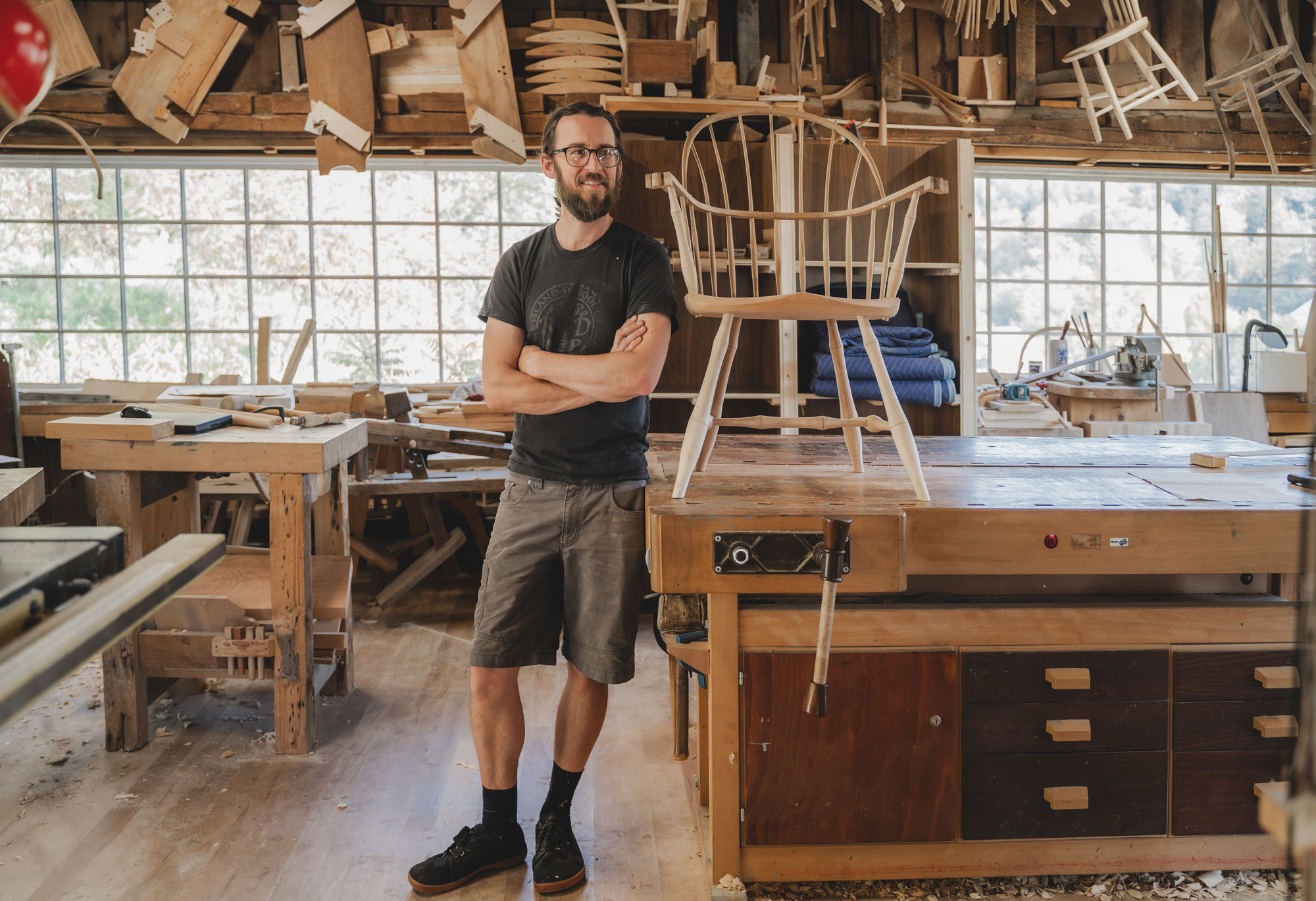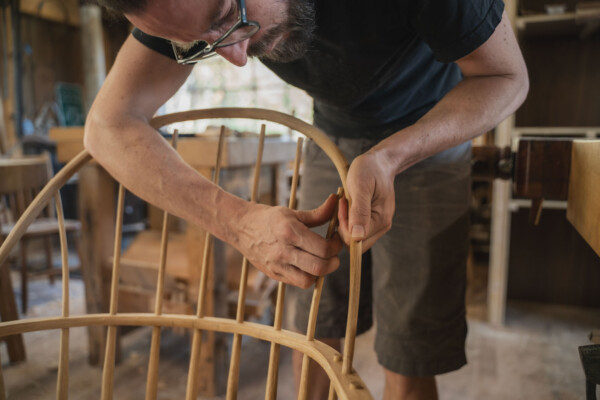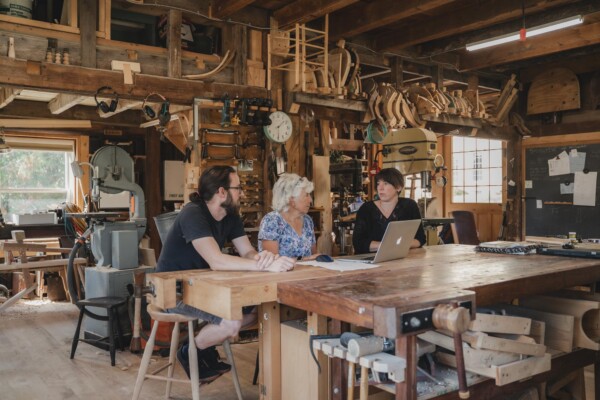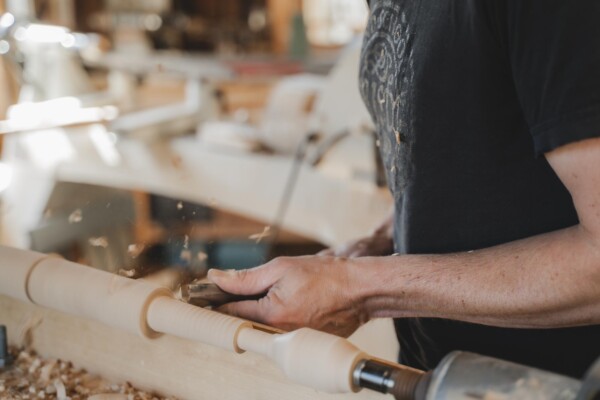Sawyer Made Balances Growth with Tradition
September 30, 2024

Pushing the creative boundaries of the Windsor chair, George Sawyer is bringing traditional techniques to modern chairmaking.
Growing up, George Sawyer would often join his father, Dave, in the small woodshop at the family’s farmhouse in Woodbury, Vermont. Most days, his dad was alone in the shop, turning hard maple or steam bending a piece of ash. On occasion, a student would be in the workshop, learning the traditional Windsor chair making technique Dave had perfected over 30 years.
Called “royalty in the world of Windsors” by the New York Times, the name Dave Sawyer is synonymous with Windsor chair making in furniture circles, but it was not until his mid-thirties that George began to wonder if carrying on his father’s legacy could be his calling. He was working as a freelance industrial designer when Dave called in 2013 to tell him that he was planning to retire. “I realized that no one else was going to be making these chairs,” said George about his decision to move back home to study under his father.

George Sawyer assembles a Windsor chair in his Woodbury workshop. Photo by Erica Houskeeper.
Expanding a legacy.
In 2015, George and his wife, Erin Smith, officially took over the business, which they named Sawyer Made. Like his father, George adheres to traditional techniques and uses hand tools to build Windsor chairs renowned for their exceptional strength and delicacy. Unlike his father, however, George, at 36, did not envision spending the rest of his working life in a 370-square foot workshop. A true creative, he began to wonder where and how far he could take traditional techniques.
“We wanted to see if we could make the business a little bigger and the designs a little more modern,” said Erin, who manages the company. “We wanted to continue teaching and the original designs Dave is so well known for, and then see where else we could bring it.”
In 2018, George and Erin applied for and received a Working Lands Enterprise Fund Grant that allowed them to renovate an old barn on their property into a larger workshop. The 2,000 square foot space includes a shop and a dedicated teaching space, allowing them to double class sizes from one or two, to four.
“Keeping that tradition alive is a big part of our values,” said Erin. “Of the people that continue to teach traditional chair making around the world, many of them learned directly from Dave, which is really special.”
The increased overhead, however, made the gaps in income that are typical of a business with a low-volume, high-quality product more pronounced. With chairs starting at $2,000 apiece, each order requires a high level of customer communication and has a typical lead time of six months or more.
“We are perpetually trying to shorten our lead times,” said Erin. “We’ve always thought that if we could bring in more bodies, or work more efficiently, we could bring down that lead time. But the biggest challenge has been adapting to our new overhead. It’s been huge.”
Through coaching, a path to growth.
For help working through that challenge, Erin turned to the Vermont Sustainable Jobs Fund (VSJF) business coaching program. With funding from the Community Navigator Pilot Program (CNPP), she was paired with coaches Jean Kissner and Carolyn Cooke.
Their first task was to establish projections based on a clear understanding of true costs and profits.
“There is so much that is out of my control,” said Erin, “but in doing this projection work with Jean, I’ve realized that a lot of the unexpected nature of budgeting can be minimized. It doesn’t have to be a surprise. That’s a huge takeaway.”
“It sounds simple and straightforward,” she said, “but when you put it out there and take an objective look at projections, it’s remarkable how much it can reveal.”
“George and Erin have a great partnership and a very clear idea about their product and customer,” said Jean. “The limited number of transactions each year makes it especially important to think carefully about growth, be patient, and stick to a path.”

Business coach Jean Kissner, center, meets with George Sawyer and Erin Smith at Sawyer Made workshop in Woodbury. Photo by Erica Houskeeper.
Another important aspect of their work with VSJF has been focus. “We have a ton of ideas and very limited time,” said Erin. “Speaking with Carolyn has helped us to better understand what we want, and which of our ideas moves us closer to our goals. Taking the gut reaction out of decisions and making it more objective has been extremely helpful.”
Pushing the boundaries of tradition.
That process has helped George and Erin to begin thinking about new product designs, expanding sales, and continued growth. Focused on custom work for businesses, such as the Commerce Inn in New York’s West Village where they recently completed an install, they see pushing the boundaries of creativity as the key to custom design work.
“There are a lot of people in green woodworking or traditional chairmaking who love the history of the Windsor and would be happy to do replica designs forever,” said Erin. “That’s the thing that differentiates us. It’s George’s design eye. He wants designers to bring him a space and ask how he can solve their problem. He wants to collaborate. There is nothing about these traditional techniques that are limited to traditional design. They can work in a modern space.”

With chairs starting at $2,000 apiece, each order requires a high level of customer communication and has a typical lead time of six months or more. Photo by Erica Houskeeper.
Pursuing that space in the market feels energetically and creatively aligned with the direction George and Erin want to take the business. One way they hope to reinforce that is through the creation of more artistic pieces.
The Wayward bench that George designed, for example, literally curves up a wall. “George has the skills and ability to make that bench, and to do it with confidence and grace,” said Erin. “Showing more and more outlandish work is our way of asking designers, what do you want us to do?”
Sawyer Made pieces will always have a functional bent, says Erin, but she and George are excited about spending time on “purely creative one-offs” that showcase George’s skill and ability. The Wayward Bench has been displayed at both the Brattleboro Museum & Art Center and The Kent Museum. George was also accepted into a residency program at the Vermont Studio Center, where he will focused on his creative practice among a community of global artists.
Building community.
Dave Sawyer passed away in the fall of 2022. His memorial service was well attended by students and furniture makers from around the country. “It was incredible to hear this community express how important he was to them,” said Erin. “He was extremely generous with his time and knowledge and that’s something we value and want to continue in his name.”
In addition to chairmaking classes in Vermont, Sawyer Made is creating their first pattern that will be for sale. It’s not a Windsor chair, but does aim to share some of George’s techniques and knowledge with a broader audience beyond those able to travel to Vermont.

George Sawyer assembles a Windsor chair in his Woodbury workshop. Photo by Erica Houskeeper.
They have also partnered with The Chairmakers Toolbox, a nonprofit in the field of chairmaking. “It’s an amazing connection because the person who started the Chairmakers Toolbox learned chairmaking from one of Dave’s students,” said Erin. “It just grows and grows. It’s a really good feeling.”
About VSJF’s Business Management Coaching Program
The Vermont Sustainable Jobs Fund provides tailored, high-touch planning, coaching, and advising for business owners and their management teams to advance profitability, job creation, and sustainable job development. Click for more information about business management coaching. Funding support for our coaching program is provided by client fees, the SBA-Community Navigator Pilot Program, the Vermont Agency of Agriculture, Food and Markets, and Vermont Housing & Conservation Board’s Farm & Forest Viability Program.
Read More Stories Like This:
- Business Sense – complete FREE training series for entrepreneurs and small business owners now available
- At Trencher’s Farmhouse, Fresh Pasta Begins with Happy Chickens
- WheelPad Entrepreneur Julie Lineberger is Keeping Families Together
- A Farm, a Family, a Way of Life
- From Chocolate to Chili Peppers
- Junction Fiber Mill: Knitting a Business Together
- Creating a Regional Food System, One Warehouse at a Time
- The Roots Farm Market Brings a New Approach to the Old General Store
- Babette’s Table: Using Projections to Grow with Intention
- Bobolink Yarns: Scaling Back to Find Success
- Hemp and Cannabis Pioneer, Scott Sparks, Navigates Legalization in Vermont




